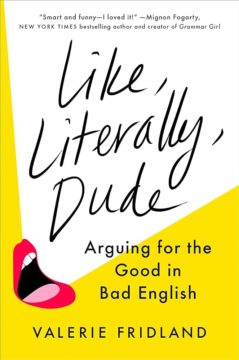Florence Hazrat at Literary Review:
 Take intensifiers like ‘totally’, ‘pretty’ and ‘completely’. We might consciously believe them to be exaggerations undermining the speaker’s point, yet people consistently report seeing linguistic booster-users as more authoritative and likeable than others.
Take intensifiers like ‘totally’, ‘pretty’ and ‘completely’. We might consciously believe them to be exaggerations undermining the speaker’s point, yet people consistently report seeing linguistic booster-users as more authoritative and likeable than others.
Then take ‘um’ and ‘uh’ (or ‘umm’ and ‘uhh’, and their consonant-multiplying siblings). Both receive an undue amount of flak for being fillers, supposedly deployed when the speaker is grasping for words, unsure what they want to say or lacking ideas. But this is not so. Fridland explains that they typically precede unfamiliar words or ideas, as well as complex sentence structures. Such non-semantic additions do what silent pauses and coughing can’t: they help the speaker speak and the listener listen. Similarly, the widely abhorred free-floating ‘like’ does not cut randomly into a ‘proper’ sentence but rather inserts itself, according to the logic of the language, either at the beginning of a sentence or before a verb, noun or adjective. It’s a form of ‘discourse marker’, used to ‘contribute to how we understand each other by providing clues to a speaker’s intentions’, writes Fridland. She points out that Shakespeare used discourse markers frequently, while the epic poem Beowulf begins with one (Hwæt!).
more here.
